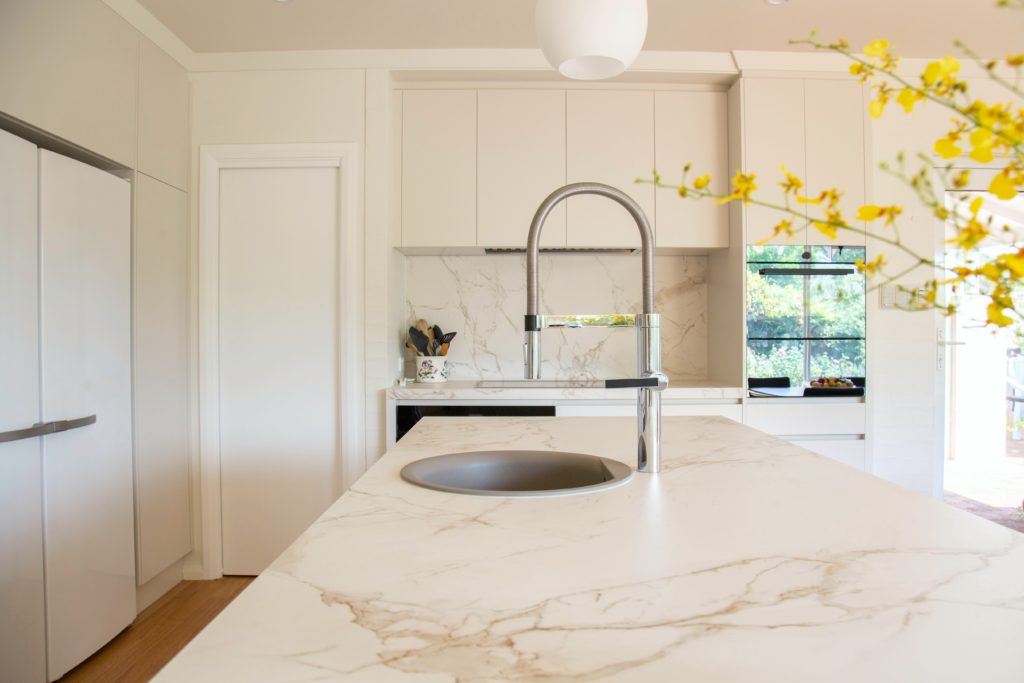
Choosing a countertop material for your kitchen remodel or new construction can be a very exciting process. With a variety of colors, textures, patterns, and materials to choose from this is an important choice to make. While the countertop you choose will have perhaps the most impact on the look and feel of your overall kitchen, there are many things to keep in mind beyond the look. Some of the main things to consider are functionality, durability, maintenance, and of course cost.
Here’s a breakdown of the different types of kitchen countertop materials along with their respective pros and cons:
Granite Countertops
Pros:
- Durable and heat-resistant
- Scratch-resistant
- Easy to clean and maintain
- Adds value to your home
- Unique patterns and colors
Cons:
- Porous surface that requires sealing to prevent staining
- Heavy and may require additional structural support
- Expensive compared to some other materials
Quartz Countertops
Pros:
- Non-porous and resistant to stains and scratches
- Wide range of colors and patterns available
- Low maintenance, does not require sealing or special cleaning products
- Durable and long-lasting
- Can mimic the look of natural stone
Cons:
- Can be more expensive than some other materials
- Can be damaged by high heat, so hot pots and pans should not be placed directly on the surface
Quartzite Countertops
Pros:
- Natural stone with unique veining and patterns
- High resistance to heat and scratches
- Durable and long-lasting
- Adds value to your home
- Can be polished to a high shine
Cons:
- Requires regular sealing to prevent stains and damage
- Limited to natural selection of color options
- Can be more expensive than some other natural stone materials
- Not as widely available as quartz
Marble Countertops
Pros:
- Elegant and timeless look
- Available in a variety of colors and patterns
- Heat-resistant
Cons:
- Porous surface that requires regular sealing
- Susceptible to scratches and stains from acidic substances
- Expensive compared to some other materials
Solid Surface Countertops
Pros:
- Non-porous and easy to clean
- Can be seamlessly integrated with sinks and backsplashes
- Wide range of colors and patterns available
- Affordable compared to some other materials
Cons:
- Can be scratched and damaged by heat
- Not as durable as some other materials
- May require professional installation
Laminate Countertops
Pros:
- Affordable and widely available
- Easy to clean and maintain
- Wide range of colors and patterns available
Cons:
- Can be easily scratched and damaged
- Not as durable as some other materials
- May not add value to your home
Concrete Countertops
Pros:
- Customizable in terms of color and design
- Durable and heat-resistant
- Adds an industrial look to your kitchen
Cons:
- Can be prone to cracking and chipping
- Requires regular sealing
- Heavy and may require additional structural support
- More expensive than some other materials
Wood Countertops
Pros:
- Adds warmth and natural beauty to your kitchen
- Durable and can be sanded and refinished
- Can be used as a cutting board
Cons:
- Requires regular sealing and oiling
- Susceptible to scratches and stains
- Not heat-resistant and can be damaged by hot pots and pans
Overall, the choice of kitchen countertop material will depend on your budget, aesthetic preferences, and lifestyle. Consider the durability, maintenance, and cost of each option before making a decision.
